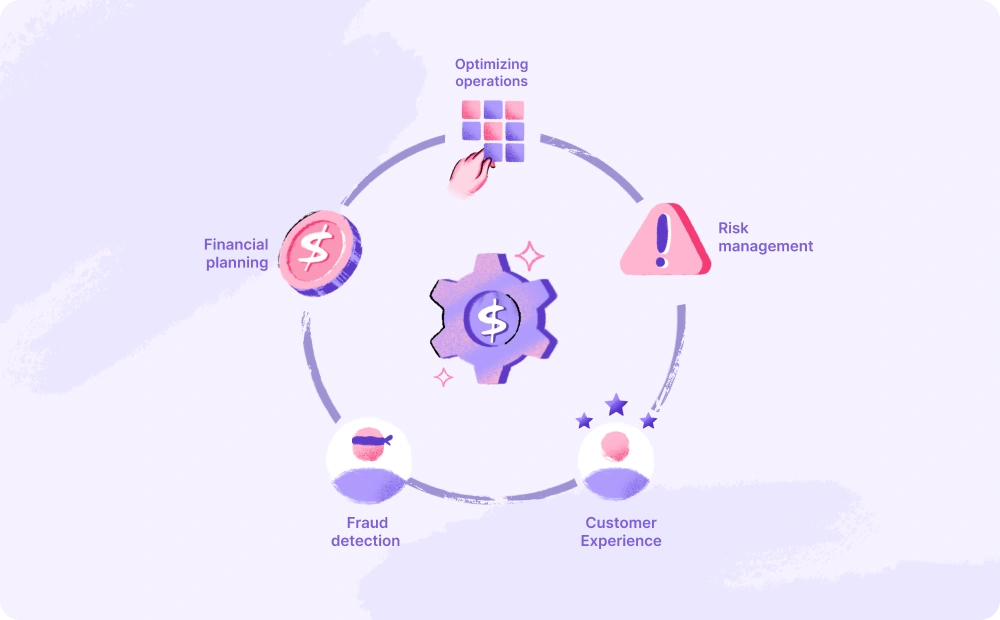Artificial Intelligence (AI) is no longer a futuristic concept – it’s the driving force behind the seismic shifts reshaping the fintech sector. From redefining how we bank to revolutionizing fraud detection, AI is at the heart of a financial services revolution. It’s not just about efficiency; it’s about creating smarter, safer, and more personalized experiences for customers worldwide.
Take India, for example, where fintech is booming like never before. With over 650 million smartphone users and a digital payments market projected to reach $201.95 billion by 2028, the country is a hotbed of innovation. Government initiatives like Digital India and the groundbreaking Unified Payments Interface (UPI)—which processed over 10 billion transactions in a single month—have laid the foundation for a digital-first economy. But what’s truly accelerating this transformation? AI.
AI is solving some of the most pressing challenges in the financial sector. Gone are the days of endless paperwork and weeks-long wait times for loan approvals. Today, AI-powered systems can analyze creditworthiness, detect fraud, and approve loans in mere minutes. For instance, companies like ZestFinance and Capital Float are leveraging AI to provide instant loan approvals to underserved populations, driving financial inclusion at an unprecedented scale.
But that’s just the beginning. AI is also transforming investment management through robo-advisors like Groww and ET Money, which use machine learning to offer personalized portfolio recommendations. In fraud detection, AI algorithms are saving billions by identifying suspicious transactions in real-time—Mastercard, for example, used AI to prevent $20 billion in fraud last year.
As AI continues to evolve, its impact on fintech will only deepen. Whether it’s enabling hyper-personalized banking experiences, enhancing cybersecurity, or democratizing access to financial services, AI is not just shaping the future of fintech—it’s defining it.
In this blog, we’ll explore how AI is strategically transforming the fintech landscape, the challenges it’s solving, and what this means for businesses and consumers alike.
The role of Artificial Intelligence in fintech
All AI-powered solutions analyze customer data to improve decision-making and enhance compliance. The fintech industry is no different. Take chatbots handling queries or AI-driven credit assessments as examples. It’s at the core of modern financial advancements.
Key applications in Indian financial services
In India, artificial intelligence is causing a revolution in the financial sector.
Automation of banking processes
AI streamlines financial technology by automating document verification, digital KYC, and eSignatures. This reduces paperwork and speeds up approvals. With less manual intervention, banks and fintech companies can improve efficiency. They can also serve a broader customer base with more efficiency. Thus, revolutionizing customer service.
Identity verification & security
AI-driven tools enhance security in banking transactions. These include biometric authentication, facial recognition, and detecting fraud. These technologies ensure that only authorized users can access sensitive financial data. As a result, they help reduce the risks of identity theft and cybercrimes in finance.
Fraud detection & risk assessment
Using AI in fintech monitors real-time transactions. It detects unusual patterns and prevents financial fraud before it happens. Advanced machine learning models keep adapting to new threats. This ensures robust security for financial institutions and their customers.
Personalized banking & investment advice
AI and machine learning customize recommendations in the financial sector. Thus helping customers with credit limits, investment portfolios, and expense tracking. Financial technology also analyzes past spending habits and goals. This helps customers make informed decisions.
Key use cases of AI in fintech
There are several key use cases of AI in financial institutions and the unexplored scope of it is limitless. AI is driving efficiency and innovation across the fintech sector.

Below are some of the key ways AI is currently shaping the future of finance:
Enhancing customer experience
Using AI in the banking industry makes it more accessible and efficient. It ensures customers get personalized and prompt service. AI chatbots provide instant help, reducing wait times and boosting service efficiency. Transaction history and spending habits determine personalized loan and credit recommendations. Virtual KYC and AI-led account openings simplify onboarding, especially for rural populations.
Fraud detection & risk management
As cyber threats rise, AI-powered financial technology is key for strong security and reduced risks. It analyzes large amounts of data in real-time. Thus improving fraud detection and protecting user assets. Fraud detection systems track transactions, flagging suspicious activities before they escalate. Additionally, AI identifies vulnerabilities, enhancing cybersecurity and safeguarding sensitive data.
Smarter financial planning
Managing finances can be complex. However, AI tools simplify financial planning by offering insights and automation. From investment strategies to budgeting, AI can be used to make informed financial decisions.
AI-driven investment tools analyze market trends and user behaviour, offering smarter investment recommendations. Automated savings and budgeting assistants help users track expenses and set financial goals. Robo-advisors further enhance financial planning. They do so by providing real-time portfolio management based on data-driven insights.
Optimizing operations
Artificial Intelligence is streamlining banking and financial services by automating critical processes. This not only improves efficiency but also reduces errors. Thus ensuring smoother operations across the industry.
AI automates loan approvals by assessing risk factors and verifying credentials. Machine learning minimizes manual errors. AI-powered systems also enhance operational efficiency, reducing downtime and improving customer experiences.
Benefits of AI in fintech
AI brings a range of benefits to the financial sector, revolutionizing the way institutions operate and interact with customers. The following points highlight some of the key advantages AI offers in improving efficiency, reducing risks, and enhancing decision-making within finance.
Increased financial inclusion via digital tools
AI-driven digital tools play a significant role in enhancing financial inclusion. AI makes financial services more accessible. Especially by automating processes such as loan approval, credit scoring, and account management. This is particularly beneficial for underserved populations and those without traditional banking access.
Individuals from remote or lower-income areas have always struggled with accessing financial services. These digital tools allow them to access services that were once out of reach. Now, they can use mobile applications, chatbots, and automated financial advisors. Using AI is breaking down geographical and financial barriers. This is enabling a more inclusive financial ecosystem.
Higher accessibility for masses, virtual availability of services
A significant advantage of AI in finance is improving accessibility to the masses. AI systems enable 24/7 availability of financial services. This offers customers the flexibility to access services anytime, anywhere. These include banking, investing, and insurance.
This virtual availability means two things. First, people are no longer constrained by traditional banking hours. Second, they are no longer tied down by geographic locations. Thus making essential financial services accessible to a broader range of individuals.
Faster decision-making and improved accuracy
AI has transformed the speed and accuracy of decision-making in the fintech industry. Artificial Intelligence can process vast amounts of data at a high speed. Especially with machine learning algorithms and predictive analytics. This enables real-time decision-making. Take AI-based credit scoring systems as an example. They analyze many data points to assess a customer’s creditworthiness. They do it faster and with more accuracy than traditional methods.
In investment and trading, AI algorithms analyze market trends and provide faster insights. This helps investors make informed decisions in a fraction of the time. AI enables faster, data-driven decisions. These improve the efficiency and accuracy of the entire fintech ecosystem.
Enhanced trust through better security measures
Artificial Intelligence in the fintech industry is also revolutionizing security measures. It’s addressing a critical concern for both businesses and customers: trust. AI-powered fraud detection systems use pattern recognition and anomaly detection. It uses these to identify suspicious activities, helping prevent fraud and unauthorized transactions.
Artificial intelligence can also ensure constant evolution and adaptation to new threats. This strengthens the security infrastructure of fintech platforms. It also provides customers with peace of mind. This advanced level of security builds greater trust between consumers and institutions. It encourages more people to engage with digital financial services.

Reduced operational costs for banks and fintech startups
Artificial Intelligence reduces operational costs for banks and fintech startups. It automates repetitive tasks and improves operational efficiency. Functions like customer service, data processing, and transaction monitoring, needed extensive human resources. Now, AI-powered systems can handle them with efficiency. Automation in finance not only reduces labour costs but also minimizes human error. Thereby ensuring more reliable and consistent service delivery. This expense reduction allows FIs to reinvest savings into innovation and service improvement. Hence, AI in fintech benefits both businesses and customers.
Faster journeys, lower dropoff rates, higher conversions
AI enhances customer service by streamlining journeys and reducing friction points. Take for instance, personalized recommendations, chatbots for instant support, and tailored financial products. They create smoother, more efficient user experiences. AI offers customers a seamless path from initial interest to completed transactions. This, in turn, lowers dropoff rates. Dropoff refers to when users abandon processes before completion.
Low dropoff rates lead to higher conversion rates. Customers tend to complete applications when you optimise their experiences. They are also inclined more to make purchases and sign up for services. The result is a more efficient process for both users and businesses. Thereby driving immense growth.
Challenges & ethical considerations
While AI offers significant benefits, its integration into the financial sector also presents several challenges. Below are some of the key challenges financial institutions face when adopting AI:
- Bias in AI models

One of the major challenges of AI in the fintech industry is the potential for bias in AI models. AI algorithms often learn from historical financial data. This may include biased patterns or past inequalities. For example, take a dataset reflecting biased decisions made in the past. The artificial intelligence model may perpetuate these biases. Especially in areas such as loan approvals and credit scoring. This can result in unfair treatment of minority groups and marginalized communities.
But, fintech companies can address and rectify this. The datasets used for training should be diverse, inclusive, and unbiased. Companies should audit and test these algorithms on a regular basis. This helps detect and correct bias. It also promotes fairness and equity in financial services.
- Data privacy & compliance
Data privacy and compliance have become crucial concerns in the fintech industry. Particularly with the introduction of India’s Digital Personal Data Protection (DPDP) Act.
Fintech companies collect and process large amounts of personal and financial data. They must focus on securing this information to protect customer privacy. Failure to do so can lead to severe consequences. They include financial penalties and damage to reputation. Compliance with the DPDP Act and other regulations is mandatory. Thus requiring fintech firms to install stringent data protection measures.
This includes obtaining explicit consent from users and safeguarding sensitive data through encryption. It also involves ensuring transparency about the usage of customer data. Besides ethical obligation, compliance is an essential business practice in a data-driven world.
- High implementation costs
Artificial intelligence in fintech presents significant benefits. Yet, initial implementation costs can be a barrier for smaller financial firms. Developing and integrating AI technology into existing systems requires large investments. Particularly in infrastructure, talent, and resources. Smaller firms may struggle with the financial burden of adopting AI solutions. This could deter them from competing with larger, established players in the industry.
The emergence of scalable AI solutions is the answer to this problem. It presents a promising opportunity for smaller firms. Cloud-based AI services help them adopt artificial intelligence. Affordable SaaS (Software as a Service) models are another key example. Especially without the need for heavy upfront investment. Leveraging these scalable solutions helps smaller firms use AI while keeping costs manageable.
- Regulatory challenges
As AI-driven fintech solutions evolve, so do financial regulations. The regulatory landscape for artificial intelligence in fintech is ever evolving. This can pose a challenge for companies striving to keep up with legal requirements. For instance, rapid technological advancements often outstrip the development of new regulations. Thus leaving firms in a state of uncertainty.
Fintech companies must ensure that their AI solutions follow financial regulations. They must adhere to both current and future regulations. This can include rules on consumer protection, transparency, and fairness. It requires a proactive approach to regulatory compliance. This includes constant monitoring of evolving laws and working with regulatory bodies. Adapting AI solutions to meet legal standards is key.
Staying ahead of regulatory challenges is crucial for fintech firms. It ensures that their AI services operate within ethical and legal boundaries.
Future trends of AI in fintech
AI is poised to revolutionize the financial landscape in ways that were once unimaginable. From enabling human-like interactions to democratizing access to financial services, the possibilities are endless.
Generative AI-powered chatbots and virtual advisors can now not just respond to queries but anticipate your needs, offering hyper-personalized financial guidance tailored to your unique goals. Companies like Klarna and Bank of America’s Erica are already leading the charge, showcasing how AI can make financial advice more accessible and intuitive than ever before.
In rural and underserved areas, AI-driven tools are set to become game-changers. By enhancing microfinance services and improving financial literacy, AI will empower millions to take control of their financial futures. For instance, platforms like PayJoy are using AI to provide microloans to individuals without traditional credit histories, bridging the gap between financial exclusion and opportunity.
The integration of AI and blockchain will further strengthen financial security, creating tamper-proof systems that safeguard transactions and data. Meanwhile, predictive lending models will revolutionize credit risk assessments, enabling more accurate loan approvals and reducing defaults. This means better access to credit for individuals and businesses, fostering economic growth and stability.
As these innovations unfold, AI will continue to drive the digital transformation of fintech, reshaping banking, lending, and investment management. The result? Faster, more inclusive, and highly secure financial services that benefit businesses and consumers alike.
Ready to embrace the future? Learn how AI can transform identity verification for your business here and take the first step toward unlocking the full potential of AI in fintech.
FAQs
1. How does AI improve customer experience in fintech?
AI helps by offering personalized services, quick responses, and smarter recommendations, making it easier for customers to manage their finances.
2. What is the future of AI in financial services?
The future of AI in financial services is bright. It will continue to automate tasks, improve decision-making, and enhance customer experiences.
3. What is the role of artificial intelligence in financial technology?
AI plays a key role by automating processes, detecting fraud, and offering personalized advice, making financial services more efficient and secure.
4. How is AI used in fintech?
AI is used in fintech for things like fraud detection, risk assessment, customer support, and personalized financial advice.
5. How can AI improve speed in financial services?
AI speeds up financial services by automating tasks, analyzing data quickly, and providing real-time insights for faster decision-making.





